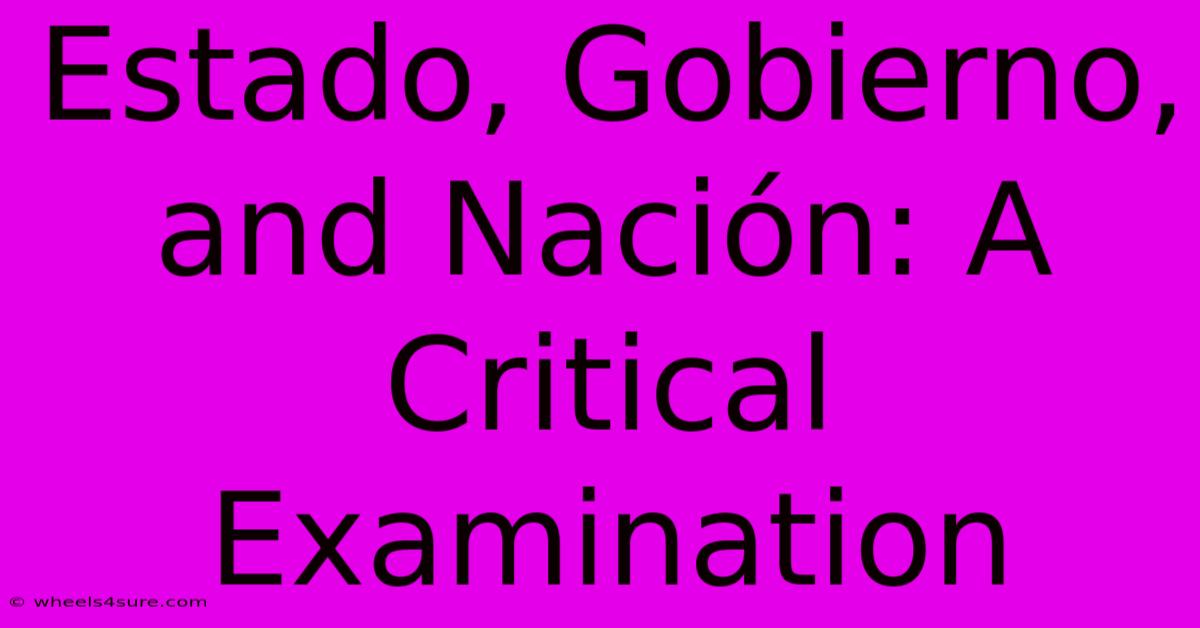Estado, Gobierno, And Nación: A Critical Examination

Table of Contents
Estado, Gobierno, and Nación: A Critical Examination
The terms Estado, Gobierno, and Nación are often used interchangeably, leading to confusion. However, understanding their distinct yet interconnected meanings is crucial for comprehending political systems and societal structures. This article will delve into a critical examination of each concept, highlighting their differences and exploring their complex relationships.
What is the Estado? (The State)
The Estado, or State, refers to the permanent institutional framework of a political entity. It encompasses the entire apparatus of power, including its legislative, executive, and judicial branches, as well as its bureaucracy, military, and police forces. The State's defining characteristic is its monopoly on the legitimate use of force within a geographically defined territory. This power is used to maintain order, enforce laws, and protect its borders. Think of the State as the hardware of governance – the enduring structure that persists beyond changes in leadership or ideology.
Key characteristics of the Estado:
- Sovereignty: Supreme authority within its territory.
- Territoriality: Control over a specific geographical area.
- Legitimacy: Acceptance of its authority by the population.
- Permanence: Enduring institution that outlasts governments.
What is the Gobierno? (The Government)
The Gobierno, or Government, represents the temporary group of individuals who exercise political power within the Estado. It's the software running on the hardware. The Government is formed through elections, coups, or other means of power transfer and is responsible for implementing the laws and policies of the State. Governments are inherently dynamic; they change with elections or other political shifts, while the Estado remains.
Key characteristics of the Gobierno:
- Temporality: Limited lifespan, subject to change.
- Executory power: Responsible for implementing the State’s policies.
- Accountability: Ideally subject to checks and balances.
- Variability: Composition and ideology can differ significantly.
What is the Nación? (The Nation)
The Nación, or Nation, refers to a community of people bound together by shared cultural, linguistic, historical, or ethnic ties. It's a concept rooted in identity and belonging, rather than formal institutional structures. Unlike the Estado and Gobierno, a Nation doesn't necessarily correspond to a specific territory; a Nation can be stateless (e.g., the Kurds) or spread across multiple States.
Key characteristics of the Nación:
- Shared identity: Common culture, language, history, or ethnicity.
- Collective consciousness: Sense of belonging and shared destiny.
- Potential for statehood: Aspiration to form its own Estado.
- Transnational nature: May not be confined to a single territory.
The Interplay between Estado, Gobierno, and Nación
The relationship between the Estado, Gobierno, and Nación is complex and often fraught with tension. A strong Estado requires a legitimate Gobierno and often seeks to cultivate a sense of national unity within its borders. However, the Estado's actions can sometimes clash with the aspirations and identities of the Nación, leading to conflict and social unrest. For example, a Government's policies might marginalize certain ethnic or linguistic groups within the Nation, eroding its legitimacy and creating instability.
Furthermore, the relationship between the Nación and the Estado can be asymmetrical. A Nation can exist without a State, while a State might encompass multiple Nations, leading to internal conflicts and the potential for secessionist movements.
Conclusion: Understanding the Nuances
Distinguishing between the Estado, Gobierno, and Nación is essential for a nuanced understanding of political systems. While they are interconnected, their distinct characteristics highlight the diverse facets of power, governance, and national identity. Recognizing these differences allows for a more informed analysis of political stability, conflict, and the ongoing evolution of states and nations worldwide. Further research into specific historical and contemporary examples can deepen this understanding and foster a more critical perspective on these fundamental concepts.

Thank you for visiting our website wich cover about Estado, Gobierno, And Nación: A Critical Examination. We hope the information provided has been useful to you. Feel free to contact us if you have any questions or need further assistance. See you next time and dont miss to bookmark.
Featured Posts
-
The Importance Of Antibodies Keeping You Healthy
Apr 05, 2025
-
Jadeja Age Making The Most Of It
Apr 05, 2025
-
Kaka Son Unleash Your Potential
Apr 05, 2025
-
911 Operators Reaction 4 Year Olds Hilarious Call
Apr 05, 2025
-
Madiha Shahs Daughter The Untold Story
Apr 05, 2025
